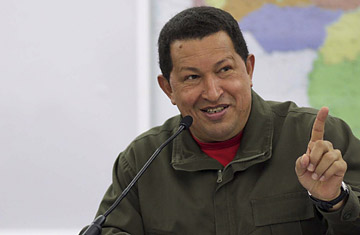
President of Venezuela Hugo Chávez
Who needs diplomacy and all its excruciating politeness? Not even the traditional "Yankee Go Home" was enough to convey the pique of Venezuelan President Hugo Chávez on Thursday as he announced that he had given U.S. Ambassador Patrick Duddy 72 hours to leave Venezuela. "Shithead Yankees, go to hell!" Chávez thundered at a campaign rally in Carabobo state Thursday, announcing that he had also asked Venezuela's ambassador to Washington, Bernardo Alvarez, to return home until a new government is elected in the U.S. that will "respect the peoples and governments of Latin America."
Chávez said he was taking the action in solidarity with Bolivia's President Evo Morales, who had expelled his own country's U.S. ambassador a day earlier. But he also accused the U.S. of being part of a plot to assassinate him, a scheme allegedly involving retired Venezuelan generals and opposition politicians.
Earlier on Thursday, Chávez had welcomed two long-range Russian bombers to Venezuela for training exercises, which will be followed in November by joint naval maneuvers with Russian warships in Venezuelan waters. Clearly Chávez is rattling a saber at Washington, but the more urgent question is whether U.S.-Venezuelan relations are at a breaking point. Chávez had been railing at Duddy in the media because of the ambassador's recent remarks suggesting that drug traffickers were finding it easier to use Venezuela as a transshipment point. But high-level sources inside Miraflores, the Caracas presidential palace, say Duddy is being expelled not for that controversy but because the Venezuelan government insists it has proof — which the sources say could be released on Friday — of Bush Administration involvement in an alleged coup plot.
Four retired generals, whose phone conversations have allegedly been captured on tape, were arrested Thursday on allegations of directing the conspiracy, and the Miraflores sources said more arrests inside the armed forces are expected.
The Miraflores sources added that Duddy was also being expelled "as a gesture of solidarity with Bolivia," whose leftist President, Chávez ally Evo Morales, expelled the U.S. ambassador there on Wednesday, accusing him of inciting anti-government violence. In a televised tirade on Thursday, Chávez said the U.S. is "trying to do [in Venezuela] what they were doing in Bolivia." Bush Administration officials' only response late Thursday night was that they were "investigating" Chávez's comments.
Chávez rarely misses an opportunity to sound the Yanqui alarm when doing so has domestic political benefit. Critics, who are questioning whether the alleged coup plot was actually real, were quick to suggest that this latest anti-gringo outburst would conveniently deflect attention away from allegedly incriminating evidence against Chávez and his government emerging in an international corruption trial that began this month in Miami. The case involves a suitcase filled with $800,000 in cash that was seized at the Buenos Aires airport in the summer of 2007, allegedly being delivered on behalf of Chávez as a presidential campaign contribution to Cristina Fernández de Kirchner, now Argentina's President. Chávez vehemently denies involvement in the money's shipment or in the alleged attempts by Venezuelan agents to cover it up and intimidate the U.S.-Venezuelan businessman caught transporting the suitcase.
Others suggest that Chávez may be trying to whip up his base in advance of local and state elections in November. He and his party desperately need a strong showing in order to reverse the unusual downward political slide he's experienced since losing a national referendum last year in which he sought to expand his socialist projects and eliminate presidential term limits.
Chávez's loud confrontations with Washington haven't been playing so well at home this year. Still, he has plenty of leverage: Venezuela is the U.S.'s fourth largest foreign supplier of oil, and Chávez has long threatened to cut off the flow if he were to find evidence Washington was moving to oust him — as he insists it did during a failed coup attempt in 2002. Regarding Duddy's expulsion, one Miraflores source points to the upcoming U.S presidential election and says, "We're taking these actions in large part because U.S.-Venezuela relations can't support the election of another adversarial government in Washington in November." But most analysts agree that Chávez needs the U.S. market just as much as the U.S. needs his oil — a codependency that will deter either side from allowing the latest diplomatic drama, or Venezuela's joint military exercises with Russia, to sever bilateral relations.
